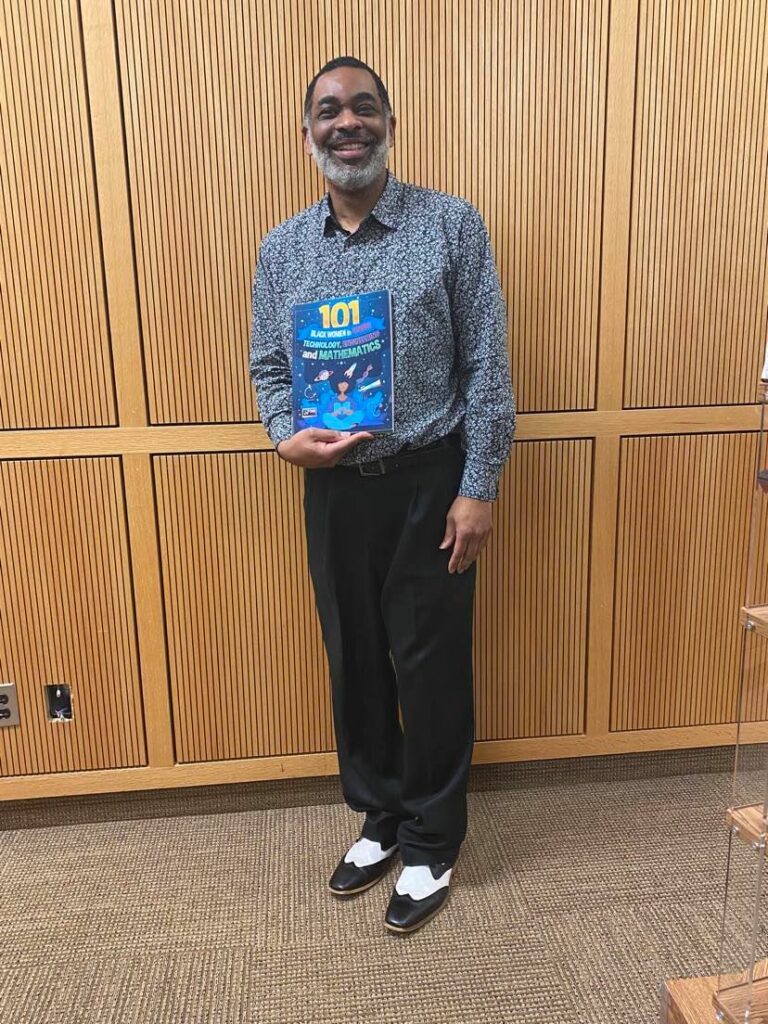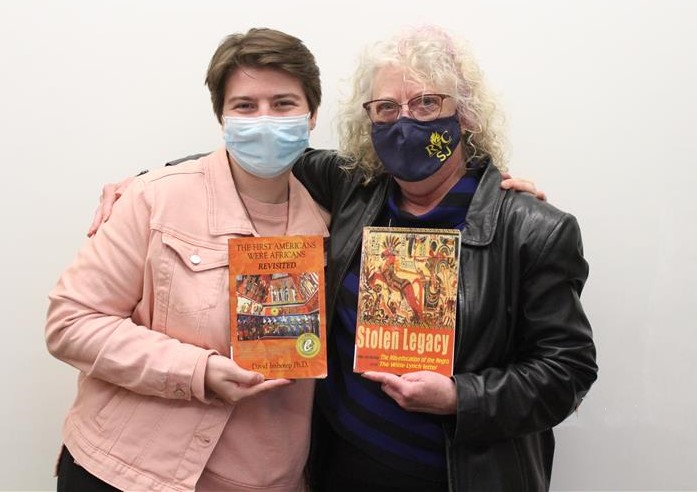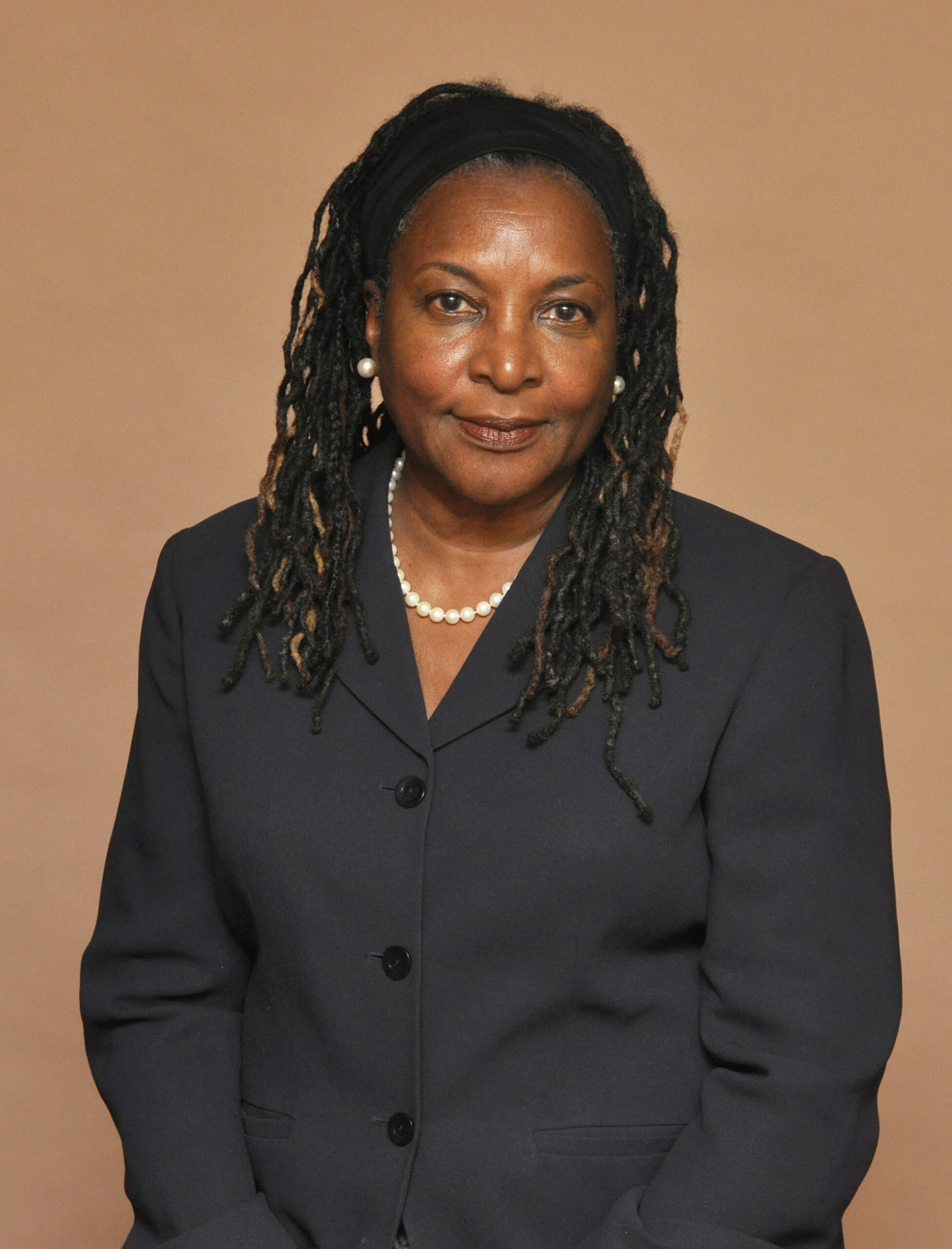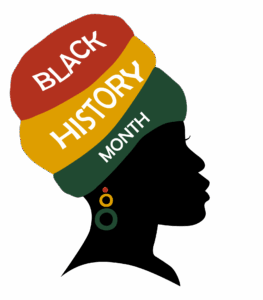RCSJ-Cumberland Library Invites Public To Discover Hidden History Through Afrocentric Collection

Arthur C. Horn, senior Education Opportunity Fund counselor, Rowan College of South Jersey, holds the educational resource "101 Black Women in Science, Technology, Engineering and Mathematics by L.A. Amber, which can be found in the RCSJ-Cumberland Library Afrocentric Collection. Photo courtesy of Rowan College South Jersey.
AC JosepH Media
VINELAND — Did you know that New Jersey didn’t officially abolish slavery until 1866, becoming the last northern state to do so?
Were you aware that the term “grandfathered in,” used in many contracts today, is a racially discriminatory phrase initiated by southern lawmakers whose goal was to disenfranchise the voters of Americans of African ancestry beginning in the late 19th through the mid-20th century?
Have you ever heard of Bessie Blount Griffin? She was an American inventor of African heritage, who, in the 1950s, invented the Disposable Cardboard Emesis Basin, widely known as the kidney dish. Blount Griffin also invented the Portable Receptacle Support, an automatic feeding device that smithsonianmag.com described as, “an extraordinary technology that would change lives for disabled veterans of the Second World War.”
Blount Griffin attempted to patent both of her inventions, but the American Veterans Administration would not accept them. She ended up selling the patent and the rights of the automatic feeding apparatus to the French government and the kidney dish to Belgium.
Blount Griffin later became a forensic handwriting analyst after being selected to learn the technique at Scotland Yard. After working at the world-famous police headquarters for a spell, she returned to the United States and, in the late 1970s, taught the Vineland (NJ) Police department and several police departments in Virginia how to detect forged documents with her knowledge of forensic handwriting analysis science.
Unbeknownst to many area residents, Blount Griffin lived her final days on Earth in Gloucester County, in the borough of Newfield, in 2009.
You can find stories like Blount Griffin’s and myriad other people in the African Diaspora who have made positive and long-lasting contributions to humanity — since time immemorial — in the Rowan College of South Jersey (RCSJ) Cumberland Campus Library.
The RCSJ-Cumberland Library has long been at the forefront of providing students, faculty, and community members access to information that help them view the world through a diverse and inclusive lens. The Library continues in its educational role by inviting the public to discover hidden history through its Afrocentric Collection.
According to Kat Givens, part-time librarian at the College, the Afrocentric Collection is an ever-expanding educational resource filled with books, DVDs, and CDs.
Additionally, the collection is accompanied by the Afrocentric Studies and African American Studies Resource Guides. “We also have an Antiracism Resource Guide created by librarian Kelly Hayden,” Givens acknowledged.
The RCSJ-Library Afrocentric Collection started off from humble beginnings.
“In 2016, we began working with (RCSJ adjunct professor) Donna Pearson on resources for her Cultural Diversity course,” RCSJ-Cumberland Head Librarian, Patti Schmid explained.
“Eventually, I found and read two books: George G.M. James’ ‘Stolen Legacy’ and Ivan Van Sertima’s ‘They Came Before Columbus.’”
“These titles initiated a seismic shift in the Library’s collection development trajectory as well as my own education,” Schmid continued. “I was jettisoned into a different worldview and history that had been hidden by Eurocentric intent.”
“Patti Schmid has always been very forward thinking in acquisitions for the library,” said Pearson, a catalyst for the collection. “When I began teaching Cultural Diversity, I wanted to add a new dimension in addition to the required text. I reached out to Ms. Schmid about the possibility of making certain books available for my classes. Among the titles were classics by Yosef Ben-Jochannan and John Henrik-Clark.”
After receiving valuable input from a variety of human resources, Schmid began amassing the materials that have become an important source for many. “Ms. Schmid has developed and expanded this collection to become one of the most inclusive collections in the area,” Pearson declared.
“Two titles we added to the collection during 2022, among others, are ‘Black Origins of Egypt (Parts 1 and 2)’, which are YouTube productions by Anthony T. Browder and ‘Critical Race Theory: An Introduction’ by Richard Delgado and Jean Stefancic,” said Schmid.
RCSJ’s Afrocentric Collection also includes children and young adult literature, history, Afrocentric fiction, Afrofuturistic fiction, women’s history, LGBTQIA+, music, and more.
According to Schmid, for the last few centuries, much of the history of people of African descent has been falsified, distorted, and hidden. The librarians and Pearson articulated the significance of having this culturally diverse collection available to all.
“It is incredibly important for wide dissemination of and access to this material,” said Schmid. “It seems as though many people don’t know about this information — including people of African descent. When histories are intentionally hidden by writers with an agenda, the stories are lost, and the material becomes fugitive.”
“We can’t expect people of all backgrounds and cultures to have access to historical truth when curriculums in public schools and higher education are whitewashed with resources filtered through a Eurocentric, heterosexual male lens,” Givens added. “It reinforces racism and oppression in our society.”
“The purpose of teaching cultural diversity is to give all students a chance to learn about the many cultures and experiences that make up our multicultural world,” said Pearson. “In order for students to fully understand ‘diversity’ they have to have access to the resources needed to learn. This collection provides that access.”
The Afrocentric Collection gives RCSJ students, faculty, and community members an opportunity to glean information about history from a different perspective. While putting this collection together, Schmid, Pearson, Givens, and Arthur C. Horn, senior Educational Opportunity Fund (EOF) counselor, RCSJ, discovered poignant nuggets of information not widely known by the general public.
“As a person born with a high level of melanin production, the Afrocentric Collection has provided me with the knowledge that the world’s physical mass is large in scope but so is the existence of African/African American cultures,” said Horn, who played an integral role in the inception of the collection by reviewing and recommending resources currently on display. “The collection will provide people with more context of the pluralism that exists [within] the [African diaspora].”
“I have learned of ancient Temples that were African centers of science and math,” Schmid revealed. “I have learned about ancient African civilizations (pre-Greek and Roman) that were sophisticated urban centers. I have learned that many of the origin stories of Western Religions are based on ancient African oral histories and stories.”
“I have learned that so much African American history did not begin in 1619 and that there is a wealth of information available,” Pearson said. “Learning about our history through an Afrocentric lens gives greater depth and meaning to our current existence.”
“African and African American culture has a history before and a history after slavery,” said Givens, who suggested people should read books like “The First Americans Were Africans: Revisited” and “NJinga of Angola: Africa’s Warrior Queen.” “Before Europeans colonized and enslaved the African continent, there were civilizations and societies more advanced than those found in Europe, such as the intellectual treasures of the Mali Empire and the gifts ancient Egypt (Kemet) gave to civilizations reaching up to the present.”
Horn noted that those who make the decisions to bury the truth, whether by omission or misinformation, can place the entire populace in a form of mental enslavement.
“The social structures rely on the miseducation of its citizenry,” Horn said. “As Carter G. Woodson wrote in his book ‘The Mis-Education of the Negro’: ‘If you can control a man’s thinking you do not have to worry about his actions. When you determine what a man shall think you do not have to concern yourself about what he will do.’”
Schmid and Givens expressed that they felt they have been lied to their entire lives after uncovering some of the truths that have been hidden by numerous historians, and the education system, and believe the Afrocentric Collection is an invaluable tool in bringing different cultures together. Pearson agreed.
“This Collection contains a wealth of information that gives credence to the fact that we are all, no matter what our background, interconnected,” said Pearson. “Students have been amazed by the information that this collection offers, not only in titles but in visual media, as well. The one comment that I have consistently received from students is, ‘I never knew that.’”
For more information visit RCSJ.edu/Library/Cumberland.
Follow Us Today On:
Note from AC JosepH Media: If you like this story and others posted on Front Runner New Jersey.com, lend us a hand so we can keep producing articles like these for New Jersey and the world to see. Click on SUPPORT FRNJ and make a contribution that will do directly in making more stories like this available. Thank you for reading!






